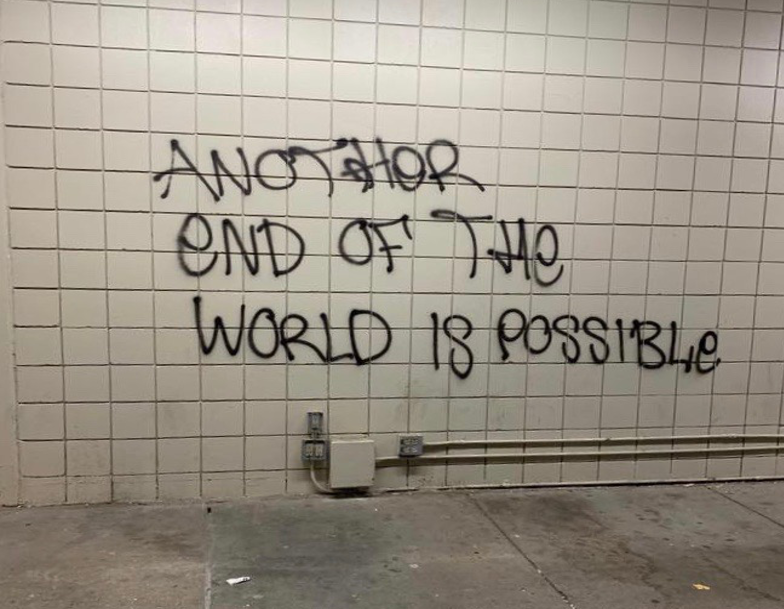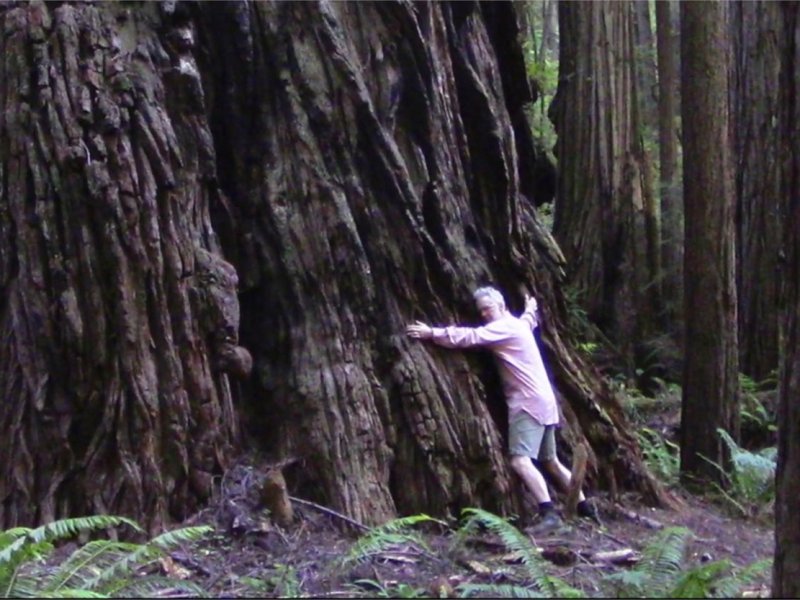
Featured Post
“Post-doom has a gorgeous sunrise.”
— Connie Barlow
Why I am not a “Doomer”
After several years of mobilizing with 350.org and other environmental groups, I came to realize that the whole movement had been addressing a surface level problem–where we get our energy from–instead of the underlying problem–how much energy we are using. In other words, the movement was focused on fossil fuels when it should be focusing on capitalism and the growth economy. There are several reasons for this misplaced focus, which include psychology and marketing (it’s easier to imagine a transition to fossil fuels than powering down our economy), as well as complicity (there’s a lot of money invested in renewables).
I also realized that it was very unlikely that our society would ever voluntarily power down, and so a collapse–economic, social, and environmental–is probably unavoidable. Following Jem Bendell, author of the now (in)famous “Deep Adaptation paper”, I anticipate “inevitable collapse, probable catastrophe, and possible extinction”. It’s impossible to say how long it will take, but I would guess that it will take generations. I would guess that it will be a prolonged and staggered collapse, a series of mini-collapses followed by partial recoveries or at least plateaus. I believe that this collapse has already begun, that it has been going on for a while, and that climate change is only one aspect of it.[FN1]
Now, this realization might lead a person to throw up their hands and say “F@#k it!” And, in fact, there is a whole community of people called “Doomers” who seem to revel in the thought of collapse and make a pastime of nihilism.
There are other people, though, who have also come to realize the inevitability of collapse, but instead of throwing up their hands, look around and ask, “Ok, so the world is ending. What do we do now? How do we live meaningfully in light of this awareness? What suffering might we be able to alleviate? What beauty might we be able to cultivate?” People have adopted various names for this attitude. Eco-theologian Michael Dowd calls it a “Post-Doom” mentality. Professor Jem Bendell calls it “Deep Adaptation”.
The phrase I have adopted is “Another End of the World is Possible”, which is the title of both my little book of essays and my website. What we “Post-Doomers” have in common is that we have passed through a kind of “dark night of the soul” with regard to climate change and environmental devastation generally, and we are now exploring the terrain on the other side of despair. It isn’t so much about recovering a lost hope, as it is figuring out how to live joyful and socially-responsible lives in light of impending collapse.
For people who have not passed through this dark night of the soul, a Post-Doom perspective can sound a lot like Doomerism. But for those on this side of despair, it is very different. I have written quite a bit about it over the last couple years, in the hope that my experience might provide encouragement to others. But it’s really something you just have to go through yourself. You have to let yourself really feel the despair, with the faith that there is something on the other side of it.
Extinction Rebellion?
Trying to convince a person to let go of false hope is kind of like trying to convince someone in an unhealthy relationship that they can live without their partner. You’re bound to be met with all kinds of resistance, including a lot of anger.
Talk about human extinction can be quite disturbing for a lot of people. But it really isn’t a radical notion from a biological perspective. Species go extinct all the time–at an accelerating rate nowadays, in fact. The human species is no exception to this. At some point, humankind will go extinct. In fact, it nearly happened once before, around 70,000 years ago, with the eruption of Mount Toba.
If we happen to survive such a bottleneck again, it’s my hope that the survivors carry into the future a very different vision of their relationship with the rest of the web of life. I believe that a critical part of developing that right relationship with the earth is to embrace death–our own individual deaths, but also our collective death in the form of extinction. Extinction is, after all, a natural part of the web of life.
“Embracing our deaths” is another way of saying “respecting our limits”. What is death, after all, if not the ultimate limit? (This is the subject of my essay, “Die Early and Often: Being Attis in the Anthropocene”.) As Guy Macpherson has suggested, at some point, the idea of “Extinction Rebellion” starts to look indistinguishable from a rebellion against nature. After all, it is precisely the lack of respect for our limits–the idea that human beings are somehow an exception to the laws of nature–that has lead to our current complex of crises, including climate change, biodiversity loss, and extreme social inequality.
How far “down” the technological ladder the collapse will take us is an open question. Nobody really knows. I think a lot will depend on how fast things collapse. A slow collapse will be better for humans, because it will enable us to adapt. But then a slow collapse will be worse for the other-than-human beings who make up the web of life, which will also be bad for us, because we’re part of that web of life too. Yes, we’ve done an ingenious job of adapting up until now, but past success is no guarantee of future survival. And there’s good evidence that the human species is now caught in a double bind: our very ingenuity is destroying the ecosystems on which we depend for life.
It really doesn’t matter whether the collapse will lead to human extinction or just the collapse of industrial civilization. The question is really academic. The point isn’t to accurately predict just how bad things are going to get. The point is to embrace the fact that all things eventually come to an end. And that is just as true of human civilizations and human species as it is of human individuals.
What About Renewables?
Once you accept that industrial civilization is collapsing, then putting all of your energy into advocating for a transition to renewable energy sources just doesn’t make sense. Sure, in the short term, a rapid transition to solar and wind will help mitigate the effects of climate change, which is why we should still do it. But even renewable energy technologies are part of the same industrial civilization which is wrecking the biosphere. The production of those solar panels and windmills is dependent on extractive industries, and all renewable energy technologies have a relatively short lifespan, meaning they have to be replaced every decade or two.
Transitioning to renewables is just not a viable long-term plan. What we need even more is a powering down of industrial civilization. The Post Carbon Institute has concluded that, in order to get along without fossil fuels, industrial nations like the United States would have to scale back their overall energy usage by three-quarters or more.
It’s going to happen anyway. The only choice we have is to try to do it intentionally, in a way that causes the least amount of suffering, or let nature force it upon us. This is the message of Naomi Klein’s book, This Changes Everything (2014):
“What the climate needs to avoid collapse is a contraction in humanity’s use of resources; what our economic model demands to avoid collapse is unfettered expansion. Only one of these sets of rules can be changed, and it’s not the laws of nature. …
“So we are left with a stark choice: allow climate disruption to change everything about our world, or change pretty much everything about our economy to avoid that fate.”
— Naomi Klein, This Changes Everything (2014)
You can read more about the limitations of renewable energy in my review of Michael Moore and Jeff Gibbs movie, Planet of the Humans.
Depression or Repression?
Some critics of this idea seem less concerned with whether it is right and more concerned with what the consequences will be if people accept it. But if we believe that civilizational collapse is inevitable, shouldn’t we be honest about it? What’s the alternative? Lying to people? Telling people that they can have their cake and eat it too? That they can continue to consume at historically unprecedented rates if they just transition to renewable energy sources? What’s the point of that?
Similar arguments have been made for withholding information about climate change from the public for fear that it will cause despair or panic. At some point, you have to trust people with the truth. Otherwise, it’s a short road to authoritarianism. If the truth leads to despair, we must trust that it will also lead us through that dark valley to something else, maybe to a place that we can barely conceive of right now. For me, at least, it has.
Like a lot of people who come to this realization, I did go through a period of depression. But I don’t think depression is necessarily a bad thing–at least in its situational, non-chronic form. I think depression can be a natural and healthy human response, if it is temporary and if it leads us to greater wholeness and wisdom. After all, what could be more natural than feeling depressed about the end of the world as we know it?
In fact, it’s the resistance to depression that can be unhealthy, especially if it causes us to repress knowledge which we would be better off facing in the long run. As grief therapist Holly Truhlar has written, the mainstream environmental movement
“failed to bring us together and offer spaces where we can be shattered. It failed to address how painful it is to live in a violent system set up to divide and exploit anyone and anything with less power and privilege (read domesticated, imperialist, white supremacist, capitalist, patriarchy). It failed to offer the tools and resources we all need to feel these traumas and losses. And, until we feel this — really carry the sorrow with us — we’re never going to be in right relationship with nature, ourselves, and each other.”
— Holly Truhlar, “The Environmental Movement Has Failed”
In my experience, the mainstream environmental movement is almost phobic about certain emotions, like despair, grief, and shame. And the movement is poorer for it.
Yes, I’ve experienced despair, but I’m far from giving up. As I explained in my essay, “ “Why I Stopped Protesting and Started a Garden”, the despair led me to re-evaluate what activism looks like for me, to ask myself how I can be most effective in the world.
My answer to that question probably isn’t going to be your answer. I’m not going to try to tell you where to focus your energy. But I will say this, if your choice is being motivated by a fear of despair, if you are fighting down a feeling of hopelessness, consider letting yourself feel it. Really feel it. Trust that there is wisdom in all of our feelings, even the dark ones, maybe especially the dark ones. And see where it takes you.
I want to know if you belong or feel abandoned.
If you know despair or can see it in others.
I want to know if you are prepared to live in the world with its harsh need to change you.
If you can look back with firm eyes saying this is where I stand.
I want to know if you know how to melt into that fierce heat of living, falling toward the center of your longing.
I want to know if you are willing to live, day by day, with the consequence of love and the bitter unwanted passion of your sure defeat.
— excerpt from David Whyte’s “Self Portrait”
You’re Not Alone
Admittedly, this is a pretty fringe idea. After all, there’s probably a no more popular idea on the planet than the idea of civilization![FN2] But I’ve never believed that the popularity of an idea was a reliable measure of its truth. There have been plenty of ideas, which at some point seemed inevitable, but eventually were debunked. Think the divine right of kings. Or slavery. I believe that civilization is another one of those ideas.
A couple years ago, when I first started writing about these ideas, I thought I was practically alone in thinking like this. But I soon learned that there is a rapidly growing community coalescing around these ideas. Here’s a list of some prominent thinkers who are talking and writing on this subject:
- Barbara Cecil, author at Resilience.org
- Britt Wray, author of Generation Dread
- Carolyn Baker, author of Collapsing Consciously
- Dahr Jamail, author of The End of Ice: Bearing Witness and Finding Meaning in the Path of Climate Disruption,
- Dave Pollard, author of the How to Save the World blog
- David Holmgren, author of the “Future Scenarios” and “Crash on Demand” essays
- David Wallace-Wells, author of The Uninhabitable Earth: Life After Warming
- Derrick Jensen, founder of Deep Green Resistance
- Dmitry Orlov, author of The Five Stages of Collapse: Survivor’s Toolkit
- Dougald Hine co-founder with Paul Kingsnorth* of the Dark Mountain Project
- Guy Macpherson, founder of Nature Bats Last and author of Only Love Remains: Dancing at the Edge of Extinction
- Jem Bendell, author of the Deep Adaptation paper and co-founder of the Deep Adaptation Forum
- Joanna Macy, founder of The Work that Reconnects
- John Michael Greer, author of numerous books on this topic, including The Long Descent: A User’s Guide to the End of the Industrial Age, The Ecotechnic Future, Collapse Now and Avoid the Rush, Dark Age America, and more.
- Jonathan Franzen, author of the article, “What If We Stopped Pretending?” and the book The End of the End of the Earth
- Laura Schmidt and Aimee Lewis-Reau, founders of the Good Grief Network
- Michael Dowd and Connie Barlow, co-founders of PostDoom.com
- Paul Kingsnorth* author of Confessions of a Recovering Environmentalist
- Richard Heinberg, senior fellow at the Post-Carbon Institute
- Roy Scranton, author of Learning to Die in the Anthropocene and We’re Doomed. Now What?
- Shaun Chamberlin, author of the Dark Optimism blog
- Timothy Beal, author of When Time is Short: Finding Our Way in the Anthropocene
- Trebbe Johnson, author of Radical Joy for Hard Times
- Vanessa Machado de Oliveira, author of Hospicing Modernity
And these are just a few of a growing community. For more, check out the conversations at PostDoom.com, as well as this reading list compiled by Michael Dowd. And also check out the Deep Adaptation Forum to find online communities of professionals and laypeople devoted to this topic.
Notes
1. UPDATED 10/13/23: Since first writing this, we have gone from having transgressed 3 of 9 planetary boundaries to having transgressed 6 of 9 planetary boundaries. Climate change is only one of them. The others are:
- novel entities (i.e., accumulation of microplastics, pesticides, and nuclear waste),
- biodiversity loss (the Sixth Great Extinction),
- the nitrogen and phosphorus cycles (from industrial farming),
- loss of freshwater, and
- land system change (i.e., deforestation).
We’re on the verge of exceeding another: ocean acidification. Other faces of collapse include peak oil, skyrocketing economic inequality, and the reemergence of fascism.
2. At its most basic, “civilization” refers to the geographical concentration of people into cities and the concentration of economic wealth and political power into the hands of an elite. The word “civilization” comes from the same root as “city”, and the first civilizations were city-states, but civilization is now global. We tend to use the term “civilization” to mean things like medicine and art. But those things existed before civilization and existed outside of civilization after the first city states arose. More about this in my essay, “What Midwives Taught Me About Anarchism”, part of my 4-part “Anarchism for Civilians” series.
*I cannot unequivocally endorse Paul Kingsnorth’s writing after the spring of 2020. After that time, following his conversion to Orthodox Christianity, Kingsnorth’s slide from Green anarchism to proto-fascism became undeniable.
Latest Posts
Follow Me
Get new content delivered directly to your inbox.

